Cuba Removed From List Of State Sponsors Of Terrorism
Another step forward toward ending a U.S. policy regarding Cuba that was outdated twenty years ago.
In a move that had been anticipated for some time now, the U.S. State Department announced today that Cuba has been removed from the list of state sponsors of terrorism:
WASHINGTON — The Obama administration on Friday removed Cubafrom a list of state sponsors of terrorism, a crucial step in normalizing ties between Washington and Havana and the latest progress in President Obama’s push to thaw relations between the United States and the island nation.
Secretary of State John F. Kerry rescinded Cuba’s designation as a terrorism sponsor at the end of a 45-day congressional notification period, which began on April 14 when Mr. Obama announced his intention to remove Cuba from the list.
The move “reflects our assessment that Cuba meets the statutory criteria for rescission,” Jeff Rathke, the State Department spokesman, said in a statement.
“While the United States has significant concerns and disagreements with a wide range of Cuba’s policies and actions,” Mr. Rathke said, “these fall outside the criteria relevant to the rescission of a State Sponsor of Terrorism designation.”
The action comes amid signs of difficulty in the negotiations between American and Cuban officials to bring about the historic reopening Mr. Obama announced in December. Despite widespread optimism, officials failed last week to reach an accord on re-establishing diplomatic relations and opening embassies.
Still, Cuba’s removal from the list – now confined to Iran, Sudan and Syria – is an important step in Mr. Obama’s effort to move past the Cold War-era hostility that long marked the relationship between the United States and Cuba. The president met with President Raúl Castro of Cuba last month in Panama at the Summit of the Americas in the first such encounter in a half-century.
Cubans saw their nation’s designation as a sponsor of terrorism, in effect since 1982 when their government was backing leftist insurgencies, as a blemish on their image and a practical hindrance that had hampered their ability to gain access to American banks.
Mr. Obama asked the State Department to review Cuba’s designation late last year, when he and Mr. Castro announced they would work to re-establish ties. A State Department review concluded last month that Cuba no longer deserved to be on the list. It said that the nation had not sponsored international terrorism recently and that it had promised not to do so.
Cuban-Americans in Congress who initially vowed to try and block the change in designation quickly said they had concluded they had no legal means of doing so, and made no attempts to oppose it.
Even with the issue of the terrorism list now resolved, American and Cuban officials face challenges in pressing forward with the rapprochement. Talks last week, the fourth round since the normalization process was announced, broke off without resolution of a checklist of issues standing in the way of converting the diplomatic outposts known as “interests sections” into full-fledged embassies.
United States negotiators want assurances from the Cubans that American diplomats at a new embassy in Havana would be able to move freely around the country and speak with whomever they wished, including opponents of the government. Cuban officials, who have frequently charged that the United States was working to undermine the government by helping dissidents, have resisted the request.
Americans have also sought guarantees that Cubans visiting an American embassy in Havana would not be harassed by the police.
Given the numerous issues that exist between the United States and Cuba, which include not only those noted above, but also issues such as the fate of Americans who are accused of, or have been convicted of crimes that have taken refuge in Cuba. One of the most prominent people fitting that description is Joanne Chesimard, who was convicted of first degree murder in the death of a New Jersey State Trooper in 1973 only to flee to Cuba in the early 1980s after having escaped from prison in 1979. Chesimard is now the only woman to be listed on the FBI’s Most Wanted Terrorist List. When the President’s opening to Cuba was first announced, New Jersey Governor Chris Christie and other politicians called on the Obama Administration to demand the return of Chesimard from her safe haven in Havana as part of the negotiations. Initially, the Cuban Government said that this would not happen but there have been subsequent indications that the return of Chesimard and other fugitive American criminals is a possibility depending on how the negotiations proceed. Other issues, of course, include the state of human rights inside Cuba itself and the claims that people who left after Castro’s revolution may have to property in Cuba. None of these are easy issues, so it’s not surprising that it’s taking time for them to be resolved. At the same time, though, CNN quoted a Cuban official in a report last week who seemed to indicate that the parties were not as far apart on the issues necessary to reach an agreement on embassies as some reports have indicated. That agreement, of course, would just be the beginning of what would be a long process of repairing a relationship that has been essentially non-existent for the past fifty-five years.
As for this decision itself, as I said when the possibility of this happening was discussed last month, it seems fairly clear that there is no good reason to keep Cuba on this list at this point in time. There’s simply no evidence that Cuba supports any of the same kind of insurgent movements it was supporting when it was placed on the list in the early 80s, and certainly no evidence that it is supporting what we would call terrorism in the modern era. Indeed, given Cuba’s economic condition at this point it’s somewhat laughable to believe that they would even have the resources to do such a thing. To no small degree, the fact that Cuba was even put on the list to begin with was more a reflection of U.S. policy toward the Castro regime since the 1960s than it was a statement of how much of a real threat to the United States the country was even at that point in time. Whatever the justification was at that point, though, it’s clear that there was no rational reason to continue the designation at that point. Of course, that’s been true of our approach to Cuba for some time now, which is why President Obama’s decision to bring an end to that outdated policy was the the right thing to do. It will be some time before relations between the United States and Cuba are “normal,” and it will likely take the passing from power of the Castro brothers for real progress to be made, but these are good first steps toward ending a policy that was outdated twenty years ago.
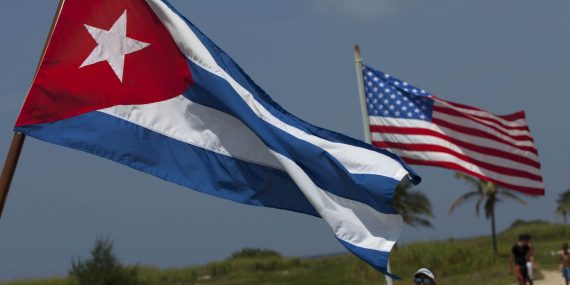

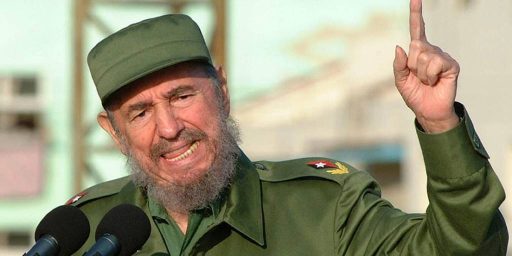
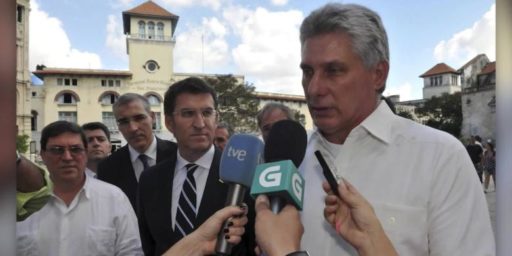
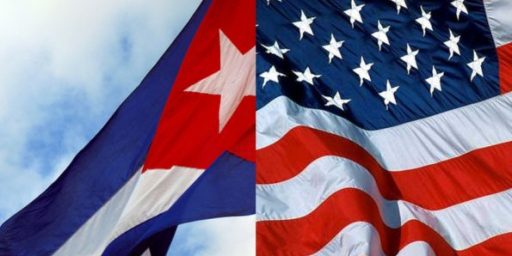
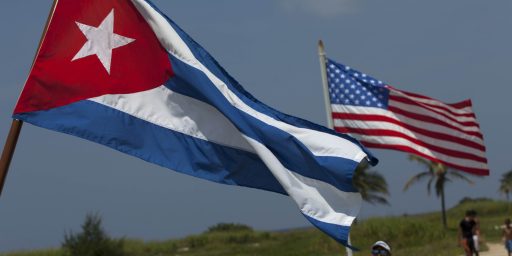
Cuba is off the list. Good. Saudi Arabia is still not on the list, and it should be.
Marco Rubio must be inconsolable.
Jeb already issued a press release charging Obama with coddling Communists. I increasingly believe that at least in the realm of politics, W is the smart Bush kid.
@humanoid.panda:
Jeb’s incompetence at basic politics is really surprising. I assumed he was a seasoned political pro, after all, Florida’s a major state with major politics to match. I guess it’s a good thing he’s got money behind him because he’s not making converts to his cause with this fumbling.
Good.
IMO Cuba did indeed once deserve a place on that list, but that was a long time ago.
Yeah yeah terrorism whatever, when can I buy one of their old cars? 😀
There should be discussions about executions, torture, and kidnappings of political dissidents during the Castro regime.Some people need to be put on trial. Documents concerning the Cuban missiles should be released. Also documents detailing the activities of Lee Harvey Oswald while he was in Cuba must be released. Raul Castro must institute real reform which includes human rights and freedom, and a free market economy, including free trade with US businesses. He should admit publicly the total failure of the communist system and apologize to the Cuban people for all the suffering they have been put through. Russia and other European soviet bloc countries dropped communism years ago. Castro needs to wake up. It’s over. Cuba needs to get out of the past.
@Tyrell:
Also, Raul Castro should wash my car once a week for a year and get me a date with Kate Upton.
@Electroman:
So could have the US. Doug mentioned “There’s simply no evidence that Cuba supports any of the same kind of insurgent movements it was supporting when it was placed on the list in the early 80s,…” Funny that at that same time the US was supporting an insurgent movement in Nicaragua.
@Tyrell:
While there at it, they can discuss all the executions, torture, and kidnappings the US has been involved in. There definitely needs to be some people put on trial for those excesses.
Long time lurker, first time poster. Good step forward. Long time coming. The bright spot of Obama’s foreign policy.
Unfortunately, I think that the impact this will have with Latin American leaders on the left, who are pretty manifest, is limited. There is just so much bad blood…
Maybe I (in my early 20s) will go to Cuba if I ever get married for a honeymoon? I’ve heard it is gorgeous from people I know who have been.
I would give good money to someone who could find a list of Tyrell’s conditions for normalizing relations with Vietnam.
The part I never got was why, if having relations with communist countries was a no-go, did we have relations with the USSR and Mao’s China????
That alone makes it seem impossible that the ban on relations with Cuba was about anything other than Florida politics. I’ve yet to hear an alternative reason – other than from a few folks who for some reason thought Castro and Cuba were controlling the USSR (presumably with mind rays from space).
@george:
Well, it wasn’t, but the fact that Cuba didn’t pack nearly as much geopolitical weight as China didn’t help.
When Obama made the announcement, I spent some time looking at the Presidents since Eisenhower and their attitudes to Cuba and Castro. Some of them might have been open to it, but either got unlucky or wasn’t willing to put in the time and effort-a considerable amount-it takes to pull of the stunt. Some just had way too much baggage with Cuba or weren’t flat out interested for reasons ranging from politics to personal. During the Cold War years, it would have been especially tough, granted, given Angola, Vietnam, etc. Remember, Castro would have also have to have been open to the idea as well. It takes two to tango, and he definitely wasn’t willing to tango with some of the Presidents.
I personally think the embargo should have ended with Bush Senior, especially since the Cubans would have been forced to dance to our tune. Maybe if he won in 1992…
Ah well. Can’t wish for what didn’t come to pass.
@Ian:
I agree. Its just silly that we had more normal relations with our supposed big enemy (the USSR ) than their puppet Cuba (and then normal relations with China under Mao). Its like something out of The Onion. Or one of Larson’s “Far Side” cartoons.
On the other hand, a lot of Canadians are hoping the embargo lasts – lots of Canadians go to Cuba in winter, and are afraid the prices will go up if Americans go too.
Canadians go to Maine in winter too, which should tell you how sh1ty winters can be in many parts of Canada.
@michael reynolds: “I assumed he was a seasoned political pro, after all, Florida’s a major state with major politics to match. ”
Charles Pierce once put it that while others states were #1 in one bad thing, only Forida was a solid #2 across the board in badness. I think that Jeb’s background in Florida might work against him, along with the fact that a lot of Americans won’t trust him. Dubya was able to exploit his daddy’s reputation for competency. Jeb can’, so we can see the real guy more clearly.